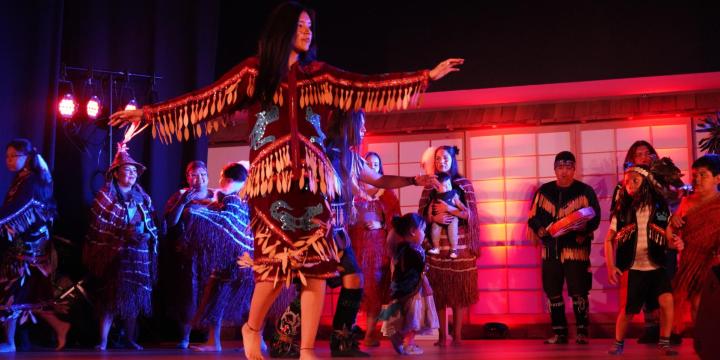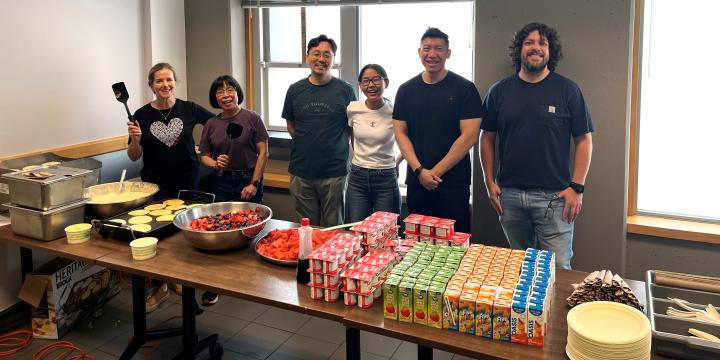
Trigger warning: mention of domestic violence and abuse.
This article contains spoilers. Banner image: Netflix
If you are a Netflix subscriber, chances are you’ve watched this show or have at least seen it trending.
Maid, a Netflix limited series, was released on October 1 and has remained in the Top 10 most viewed shows in 43 countries ever since. Inspired by Stephanie Land’s 2019 memoir, Maid: Hard Work, Low Pay, and a Mother’s Will to Survive, the show follows 25-year-old Alex (Margaret Qualley), a single mother fleeing an abusive relationship who takes a job as a housecleaner in very precarious conditions to overcome homelessness and create a better life for herself and her two-year-old daughter.
Filmed on Vancouver Island, the show shines a light on domestic and emotional abuse, the infuriating catch-22s of government systems built for failure, and the precariousness of life below the poverty line.
Alex’s journey could not have been possible without the support she finds along the way. Jody (Amy Reid), the social services worker who helps Alex navigate the complex welfare system and find housing, and Denise (BJ Harrison), who runs the domestic violence shelter and provides Alex with safety, teaches her lessons of self-worth and helps her take control of her life. Jody and Denise represent the many support systems that organizations such as the YWCA provide for women experiencing domestic abuse.
Maid addresses many of the critical challenges women experiencing abuse face:
Emotional Abuse
After fleeing home in the middle of the night bringing along her sleeping two-year-old daughter, Alex finds herself homeless and with only $18 dollars in her pocket. After spending the night in her car, she goes to a social services agency, where the worker offers her help to file a police report.
“And say what?” Alex asks, “That he didn’t hit me?”
Like Alex, many women struggle to first define and then prove the emotional abuse. While bruises and broken bones are visible and can be documented, the scars left behind by emotional abuse are often more difficult for people to see and understand.
“Before they bite, they bark. Before they hit you, they hit near you”,
says Danielle (Aimee Carrero), a fellow single mother who becomes Alex’s friend at the women’s shelter.
>> For more on identifying emotional abuse and where to go for help, read our blog Is Your Relationship Healthy? Identifying the Signs of Abuse.
Financial Abuse
Alex’s abuser prevents her from working by cutting off her phone and taking away her transportation. Common forms of financial abuse include taking money without permission, controlling bank accounts, running up debt, credit card fraud, hiding assets, and preventing someone from making money-related decisions. Surveys show nearly all domestic violence survivors experience financial abuse and the top reason that survivors stay with abusers is because they cannot afford to leave.
After working so hard to escape him, there is a time where Alex returns to her abusive boyfriend. While it can be heartbreaking to watch, this situation is common due to the challenges faced outside the relationship and the level of control abusers can have. Support services will be there for the woman whenever she is ready to take the next brave step.
Catch-22
To qualify for subsidized housing or food stamps, Alex needs to get a job, which she can’t get without access to child care. And guess what? The grants available for child care require proof of employment. It’s a vicious cycle.
Many single mothers who are leaving abusive relationships often see themselves in this impossible situation. Here in Metro Vancouver, we have the highest rents and lowest vacancy rates of any region in Canada. The lack of housing options places women at greater risk of returning to or staying in an abusive situation. Child care rates in our region also makes it impossible for many women to pursue employment opportunities.
The YWCA has been advocating for universal child care and more affordable housing for decades.
Navigating the Court Systems
The show follows Alex’s struggles navigating the legal systems to gain custody of her daughter. In episode two, she is contacted by her ex-partner's lawyer, who informs her that he has filed to reclaim full custody of their daughter. Alex loses the case as she has no lawyer and no reliable housing or employment.
Here in BC, legal aid is chronically under-funded, leaving many women who are seeking safety for themselves and their children to navigate the legal system without a lawyer, facing economic and systemic barriers like gender bias and stereotypes and a lack of trauma-informed supports. Moreover, abusers often use the justice system to continue their abuse or harassment, putting women and their children at risk.
Access to Justice, including increased funding for legal aid, is a critical need for women escaping violence to ensure they can assert their social, economic, cultural, political and civil rights.
Acknowledging Alex’s Privilege
The show does a good job of portraying Alex’s struggles to lift herself and her daughter out of poverty, however, as Allegra Frank writes, would Maid be a hit if Alex were Black?
Margaret Qualley, who plays Alex, recognizes: “Obviously, if Alex were a Person of Colour she likely, given the world that we live in, wouldn’t have been able to escape her situation. There are many Alexes that, despite their incredible efforts, are unable to navigate the system because it’s made to be impossible.”
Black, Indigenous and Women of Colour are over-represented in precarious and low-paying jobs and disproportionately impacted by abuse and barriers to support services. We will not realize gender equality and increased safety for women until systemic racism is addressed in a meaningful way.
Support is Available
At the YWCA, we offer a range of services and supports for single mothers and women who have experienced abuse:
Short-term and transition housing: Emergency and second-stage transition housing for women leaving abuse. Staff is available to provide:
- Emotional support
- Advocacy with government and community agencies
- Safety planning
- Court accompaniments
- Information and referrals
- Parenting support
-
Assistance to find permanent housing
Long-term housing: YWCA housing communities provide safe and affordable homes for single women and their dependent children. Residents have access to other YWCA programs and services, and a foundation to move towards health, well-being and economic stability.
Legal supports: YWCA staff lawyer and legal educator hosts free workshops for the public on a broad range of legal issues, advocates for a more equitable, humane, and compassionate legal system, and supports YWCA staff to navigate courts and institutions. Free legal services to YWCA housing residents who have experienced violence from an intimate partner and who have ongoing safety issues.
Support for women who have experienced abuse: Practical and emotional support for self-identifying women who are experiencing violence or abuse in an intimate relationship.
Support for single mothers: Individual or group support, including:
- Employment and education resources
- Parenting resources
- Legal/financial information and referrals
- Resources for women who have experienced abuse in a current or past relationship
- Help with document completion
- Peer support
This holiday season, give a gift that makes a lasting impact in the lives of local single-mother-led families. Starting at $25, your gift provides holistic supports such as nutritious meals, emergency grocery vouchers, a safe and affordable home, youth mentorship and literacy programs for children.
Make a one-time or monthly donation

